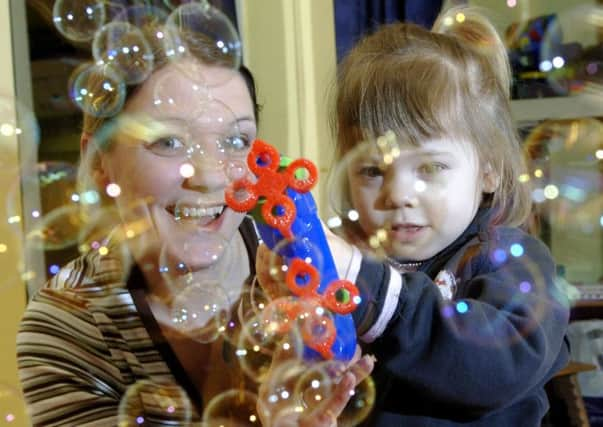Leaders: Understanding autism | Pressure on Putin


Since then, awareness of underlying conditions – most notably dyslexia and autism – has grown quite remarkably. And, as society has learned more about the impact of these conditions, schools have tailored their approaches to bringing out the best from those youngsters affected.
At the same time, we have seen a welcome increase in the number of pupils with special needs attending mainstream schools. We may have a tendency to look back on our school days as the best of our lives but the evidence is that the education system provides specific challenges for a growing number of children. Last year, more than 130,000 – around one in five of Scottish pupils – needed extra help in class because of a wide range of problems. The number listed as requiring “additional support needs” due to autistic spectrum disorder was 9,946, an increase of 15 per cent on the previous year.
Advertisement
Hide AdAdvertisement
Hide AdOf course, we welcome the news more children affected by autism are being diagnosed and the necessary support put in place. But we share the concerns of politicians and campaigners who ask whether, with such a rise in numbers, schools and teachers are fully equipped to respond. The understanding of a child with special needs by a teacher is one thing. That teacher having the time or the support staff to fully attend to that child is quite another.
And the need for support doesn’t begin and end in the classroom. Children affected by autism may find the social aspects of school particularly challenging. Many require help to understand and successfully communicate with those around them. Failure to provide that assistance can, say campaigners, harm children’s self-esteem and lead to mental health problems. The Scottish Conservatives say there are questions to be asked about the scale of additional support needs. We agree.
Parents and carers have fought for years to have their children’s needs recognised. We must respect their achievements and respond to this issue on the basis that they deserve to be treated with sympathy and determination. And if we proceed on that basis, the only option is for the Scottish Government to ensure that the finances necessary to create a strong, nationwide network of support staff are made available.
It is fundamental to our society that we provide every child with an education. When we discover that extra steps may be needed in some cases then we have no option but to take them. Failure to do so would be a betrayal of a great many children. Money, though, is tight across all government departments and ensuring special needs support gets the help it merits may require a change of priorities.
Education secretary Mike Russell has repeatedly spoken of his willingness to challenge orthodox thinking in the education system. Last year, he hinted that promises of reduced class sizes – for years a favourite manifesto pledge across mainstream politics – might not be the be all and end all. Politicians have been engaged in a Dutch auction in which they offer ever smaller class sizes, even though there is little proof to suggest it’s necessary. Here is another opportunity to think differently.
Support for pupils with special needs does make a huge difference, not only to those children with challenges but to everyone in the class, and to families too. It is not so very long ago that we blithely failed youngsters who, with even a little understanding, might have flourished. Now that we better understand how to help those children realise their full potential, any failure to do so would be indefensible.
Only Russia’s president can prevent a repeat of the terrible scenes in Odessa
SEEING pictures of the fire in Trade Unions House in Odessa, it is impossible to escape the conclusion that conflict in Ukraine is liable to continue escalating. Days after international leaders agreed a new round of sanctions against Russia over its actions in the former Soviet state, 42 people died in the blaze. As fire gripped the building, some jumped to their deaths rather than wait for the smoke and flames to take them.
Advertisement
Hide AdAdvertisement
Hide AdPro-Russian campaigners blame Ukrainian nationalists for the atrocity, and vice versa. What is certain is that both sides were engaged in a petrol bomb battle before Trade Unions House caught fire. On both sides of this conflict, there are people willing to burn other humans to death.
Russian president Vladimir Putin has so far remained defiant in the face of international condemnation of his actions in Ukraine. The threat of sanctions did not prevent a corrupt referendum which allowed Russia to annex Crimea, and nor have they persuaded Putin to remove his troops – or his provocateurs – from Ukraine.
Yet for all his machismo, Putin understands that his government will lose support at home if the economy takes a battering.
Sanctions have already knocked Russia’s credit rating and threatened the stability of the rouble. The international community must ramp up that pressure. Putin must know that not only are his actions unpardonable but that, if he continues, his country will pay a heavy economic price.
But it is not just Russia which must take steps. The Ukrainian government must do what it can to prevent outrages being carried out in the name of national freedom. While world leaders condemn Russian aggression, Ukraine must play its part in trying to keep a lid on this pressure cooker. It realised long ago that it must not give Russia an excuse to openly invade more parts of the country, and it must keep to that and allow western sanctions time to bite. Military operations should not continue for now.
The scenes in Odessa on Friday were shocking. Our hope must be that they do not become commonplace. Only Vladimir Putin can ensure this outcome. It is essential that the United Nations does all it can to ensure he runs out of options.